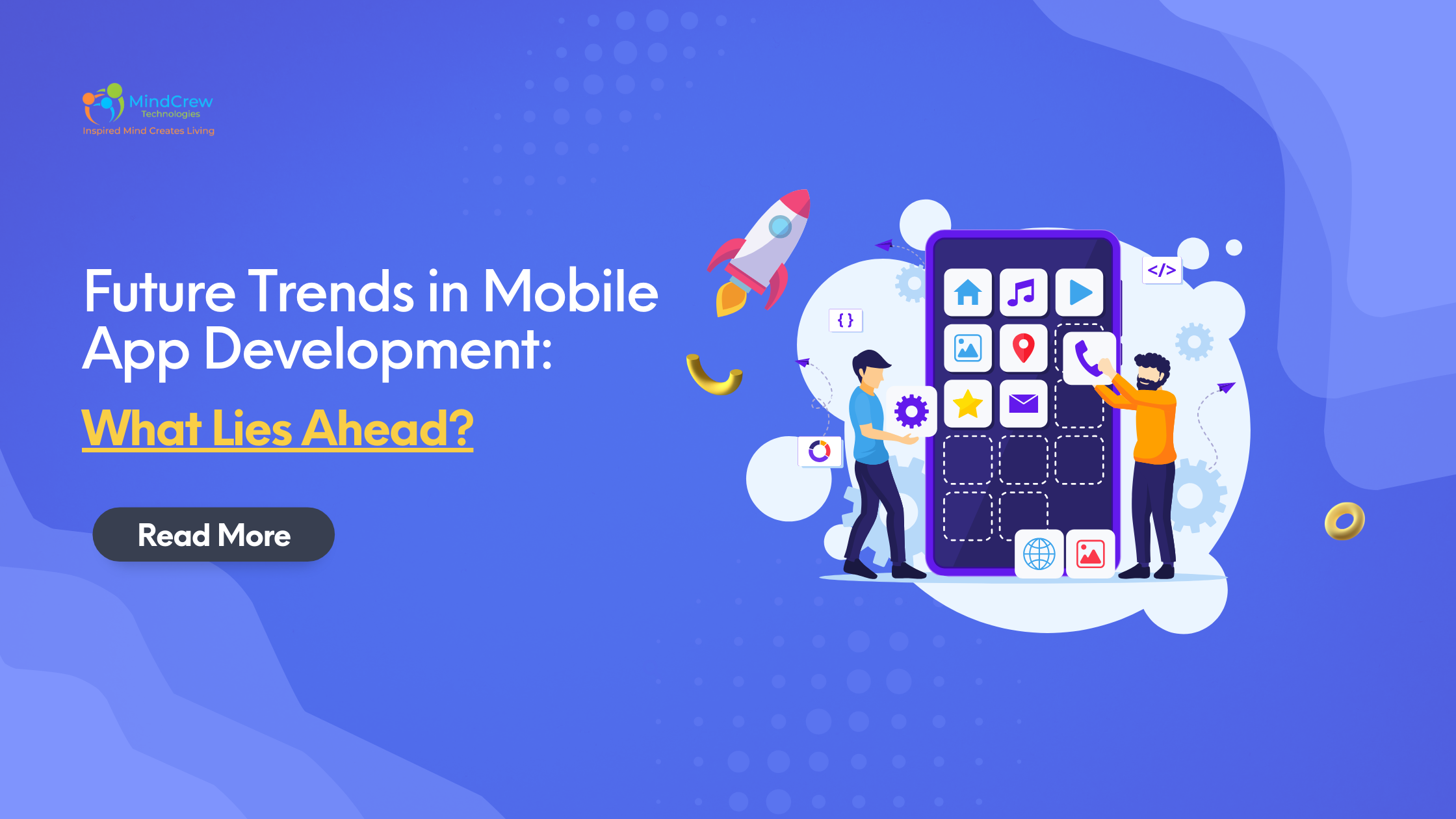Future Trends in Mobile App Development: What Lies Ahead?
Mobile applications have revolutionized how we interact with technology, and their evolution continues to shape the digital landscape. As we look forward, several key trends are poised to redefine mobile app development, catering to evolving user demands and technological advancements. Let’s delve deeper into these trends, explore their potential impact, and examine how leading companies and new technologies are shaping the future.
Introduction:
The Evolution of Mobile Apps
Mobile apps have come a long way since their inception, evolving from simple utilities to powerful tools that enhance productivity, entertainment, and connectivity. Early mobile apps were limited in scope and functionality, often focusing on single tasks like calculators or calendars. However, with the advent of smartphones, apps have become integral to our daily lives, offering everything from social networking and shopping to banking and health monitoring. As the technology behind these apps continues to evolve, we can expect even more groundbreaking changes in the near future.
1. Artificial Intelligence (AI) and Machine Learning Integration
AI and machine learning are set to drive the next phase of innovation in mobile apps. From personalized user experiences to predictive analytics and automation, AI-powered apps will deliver more intuitive and proactive solutions. Imagine apps that learn from user behavior, anticipate needs, and adapt in real-time to provide seamless interactions.
Personalized Experiences: Companies like Netflix and Spotify have already demonstrated the power of AI in personalizing content. AI algorithms analyze user preferences and behavior to recommend movies, shows, and music tailored to individual tastes. In the future, this level of personalization will become standard across all types of apps, including e-commerce, health, and education.
Predictive Analytics: AI will enable apps to predict user needs before they are explicitly expressed. For example, travel apps could suggest destinations based on past trips, weather conditions, and personal preferences. Health apps might predict potential health issues and recommend preventive measures based on user data.
Automation: Chatbots and virtual assistants, powered by AI, will become more sophisticated, handling more complex queries and tasks. Apps like Google Assistant and Apple’s Siri are constantly improving, aiming to provide a more natural and human-like interaction experience.
2. Internet of Things (IoT) and Connected Devices
The IoT ecosystem is expanding rapidly, connecting everyday objects to the internet and enabling data exchange between devices. Mobile apps will increasingly serve as central hubs for controlling IoT devices, offering users unprecedented convenience and control over their smart homes, vehicles, and wearable tech.
Smart Homes: Apps like Google Home and Amazon Alexa already allow users to control lights, thermostats, and security systems with their smartphones. Future developments will make these interactions even more seamless and integrated. Imagine an app that not only controls your devices but also learns your habits and adjusts settings automatically.
Wearable Tech: Fitness trackers and smartwatches are becoming more sophisticated, collecting a wide range of health data. Apps like Fitbit and Apple Health will evolve to provide deeper insights and personalized health recommendations, making health management more proactive.
Connected Vehicles: Apps will play a crucial role in the development of connected vehicles. Companies like Tesla are already leading the way, offering apps that allow users to control and monitor their cars remotely. Future apps could provide real-time diagnostics, predictive maintenance alerts, and even automated driving capabilities.
3. Augmented Reality (AR) and Virtual Reality (VR) Experiences
AR and VR technologies are poised to transform mobile app experiences, blurring the lines between the physical and digital worlds. From immersive gaming and virtual tours to interactive training simulations and virtual shopping experiences, AR and VR will redefine how users engage with content and interact with brands.
Immersive Gaming: Games like Pokémon GO and Minecraft Earth have showcased the potential of AR in gaming. Future games will offer even more immersive experiences, blending the real world with virtual elements in innovative ways.
Virtual Shopping: Retailers are exploring AR to enhance the shopping experience. Apps like IKEA Place allow users to visualize furniture in their homes before making a purchase. This technology will become more widespread, helping customers make better-informed decisions and reducing the likelihood of returns.
Training and Education: AR and VR will revolutionize training and education by providing interactive and immersive learning experiences. Medical students, for example, could practice surgeries in a virtual environment, gaining valuable hands-on experience without any risk.
4. 5G Technology and Enhanced Connectivity
The rollout of 5G networks promises ultra-fast speeds, lower latency, and enhanced connectivity, unlocking new possibilities for mobile app developers. Apps will leverage 5G capabilities to deliver high-definition streaming, real-time multiplayer gaming, and seamless cloud-based experiences without lag or interruptions.
High-Definition Streaming: Streaming services like Netflix and Disney+ will benefit from 5G by offering higher quality video with less buffering. This will enhance the user experience, making it possible to stream 4K and even 8K content on mobile devices.
Real-Time Gaming: 5G will enable real-time multiplayer gaming with minimal lag, providing a more immersive and competitive experience. Game developers will be able to create more complex and visually stunning games, pushing the boundaries of mobile gaming.
Cloud-Based Experiences: With faster and more reliable connectivity, cloud-based apps will become more prevalent. Apps like Google Stadia and Microsoft xCloud allow users to stream games directly from the cloud, eliminating the need for high-end hardware. This trend will extend to other applications, such as productivity tools and creative software.
5. Progressive Web Apps (PWAs) and Cross-Platform Development
PWAs are gaining traction as they offer the benefits of both web and native mobile apps. These lightweight, fast-loading apps provide a seamless user experience across devices and platforms, eliminating the need for multiple versions. Cross-platform development frameworks like React Native and Flutter will continue to streamline app development, reducing time-to-market and maintenance costs.
Benefits of PWAs: Companies like Twitter and Starbucks have successfully implemented PWAs, providing users with a fast, reliable, and engaging experience even in areas with poor connectivity. PWAs are also easier to update, as changes can be made on the server side without requiring users to download updates.
Cross-Platform Development: React Native and Flutter have simplified the development process by allowing developers to write code once and deploy it across multiple platforms. This approach not only saves time and resources but also ensures a consistent user experience. As these frameworks continue to evolve, we can expect even more robust and feature-rich cross-platform apps.
6. Voice-Enabled and Natural Language Processing (NLP)
Voice assistants like Siri, Alexa, and Google Assistant have paved the way for voice-enabled apps that allow users to perform tasks hands-free. NLP advancements will enhance app capabilities, enabling more natural and conversational interactions. Voice-driven interfaces will become standard, offering accessibility and convenience to a broader audience.
Voice-Activated Control: Voice commands will become more prevalent in controlling smart devices and performing everyday tasks. For instance, users will be able to book appointments, send messages, and control their home automation systems using voice commands.
Conversational Interfaces: Apps will leverage NLP to create more engaging and interactive user experiences. Customer service apps, for example, will use advanced chatbots to handle inquiries and provide support, reducing the need for human intervention.
Accessibility: Voice-enabled apps will make technology more accessible to individuals with disabilities. Voice commands can assist those with visual impairments or mobility issues, ensuring that everyone can benefit from the latest technological advancements.
7. Enhanced Security and Privacy Measures
As cyber threats evolve, ensuring robust security and privacy measures will be paramount for mobile app developers. From biometric authentication and data encryption to secure APIs and compliance with global regulations (such as GDPR), apps must prioritize user trust and data protection to maintain credibility and loyalty.
Biometric Authentication: Fingerprint scanning, facial recognition, and voice recognition are becoming standard security features in mobile apps. These methods provide a higher level of security compared to traditional passwords, reducing the risk of unauthorized access.
Data Encryption: End-to-end encryption ensures that data transmitted between users and apps remains secure. Messaging apps like WhatsApp have implemented this technology to protect user communications from eavesdropping.
Regulatory Compliance: With regulations like GDPR in place, developers must ensure that their apps comply with data protection laws. This includes obtaining user consent for data collection, providing transparency about data usage, and allowing users to control their personal information.
8. Blockchain Technology for Transparency and Trust
Blockchain’s decentralized nature offers potential applications beyond cryptocurrencies, including secure transactions, supply chain transparency, and digital identity verification. Mobile apps integrating blockchain technology can enhance data integrity, enable peer-to-peer transactions, and empower users with greater control over their digital assets.
Secure Transactions: Blockchain can provide a secure and transparent way to conduct transactions. Apps like BitPay allow users to make payments using cryptocurrencies, offering an alternative to traditional banking systems.
Supply Chain Transparency: Blockchain can track the movement of goods through the supply chain, providing transparency and accountability. This technology can be applied to apps in industries like food and pharmaceuticals, ensuring that products are genuine and safe.
Digital Identity Verification: Blockchain can provide a secure way to verify digital identities, reducing the risk of identity theft and fraud. Apps using blockchain for identity verification can offer users greater control over their personal information, ensuring that it is only shared with trusted parties.
Conclusion:
Embracing Innovation in Mobile App Development
The future of mobile app development is marked by innovation, driven by technological advancements and evolving user expectations. As AI, IoT, AR, 5G, and other emerging technologies converge, developers have unprecedented opportunities to create transformative experiences that enrich lives and reshape industries. By staying agile, embracing new tools and methodologies, and prioritizing user-centric design, developers can harness these trends to create the next generation of mobile apps that redefine possibilities.







